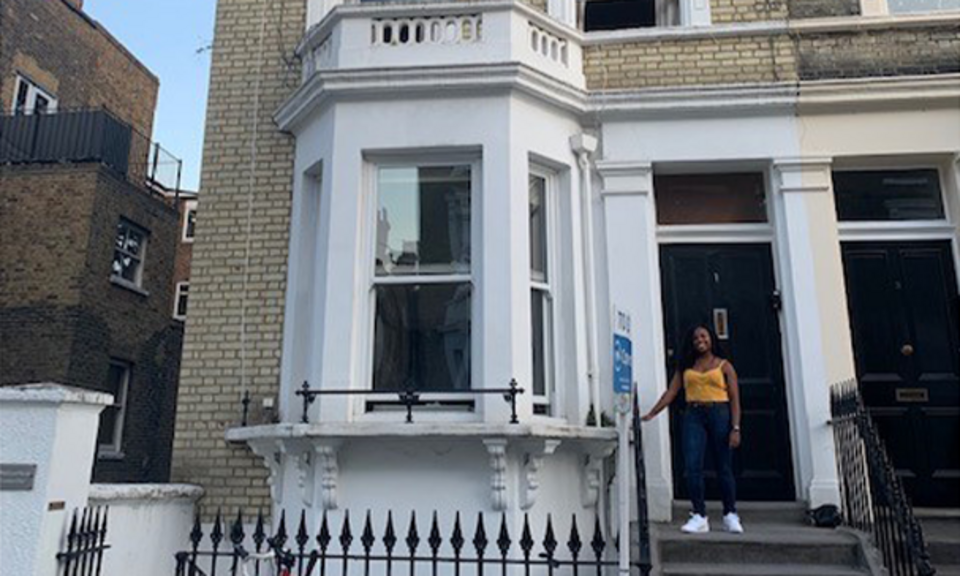Published
Blog type
My name is Briana Johnston and I moved to London from the United States to start a Full-Time MBA programme at Imperial Business School. I came to London by myself and booked an Airbnb to stay in for my first week, with the plan to find a flat within that week and move in. Fortunately, I had teamed up with another woman in my programme to live together prior to moving, so I had someone to experience the joys and struggles of moving abroad with! Even with almost three weeks to get settled in, time seemed to fly, but for those who may not have as much time to settle in, I’ve compiled six tips for students moving to London from abroad.
Give yourself at least one week to get settled before starting classes
If you have the flexibility to move to London before your programme begins, I would recommend giving yourself at least a week to really settle in. This will allow you time to get rid of any jet lag, set-up a bank account, find a place to live, and start to get familiar with your neighbourhood.
It’s also nice to have a bit of a break before starting a programme at Imperial Business School, because the year will start off quite intense and will only get more demanding!
Set up a bank account ASAP
Setting up a bank account in the UK can be a bit of a catch-22 because it requires you to have a permanent address, plus, you can’t rent a flat without a bank account. However, there is a way around this, with online banks such as Monzo and Revolut, it is extremely easy to set up a bank account online. I would recommend setting up an account with one of them before trying to go through the harder process of setting up a bank account with larger banks such as Barclays or HSBC.
In order to set up a Monzo or Revolut account, you will only need to provide an address where they can mail you your card. If you have a friend in London, send the card to them. However, you could also have it mailed to the accommodation where you’re staying.
If you’re able to set up the account right before you move, you could have a bank account ready to go by the time you arrive in London, making it much easier to rent a flat.
Use TransferWise to move foreign currency into your UK bank account
The TransferWise app was extremely helpful and straightforward in my moving process, as I was not only able to transfer money from my US bank account to my UK bank account, but I was also able to secure my flat by transferring money to my landlord for the holding deposit via the app, which only took a few hours (it could take longer depending on your country and the time of day/day of week you initiate the transfer).
Act quickly when renting a flat and don't be afraid to negotiate
If you are not planning to stay in graduate accommodation offered by Imperial, be prepared to act extremely fast when looking for a flat in London. Whether you’re going through a letting agent, OpenRent (the landlord directly), or SpareRoom (a flatmate finder website), flats can go off the market within a day, so be prepared to pay the holding deposit needed to secure a flat immediately after a viewing.
Also, don’t be afraid to negotiate rent down as it is very common to do so in London. In my case, I found the flat that I currently live in through OpenRent and viewed it 30 minutes after the previous tenant had moved out. I had already seen a few flats by that point and knew that this was the best of what I’d seen, so my roommate and I immediately expressed interest during our viewing and negotiated the rent down by £50 per month. We then transferred over our holding deposit via TransferWise, once the landlord agreed with everything, the flat went off the market that day!
Prepare to pay six months rent upfront
As a student with no income, if you do not have a UK guarantor, be prepared to pay six month’s rent upfront when securing a flat. This is typically not the case if you’re renting a room via SpareRoom or Gumtree, but for letting agents and landlords, this is what they typically require.
It’s not fun to see all of that money leave in one go, so make sure you have budgeted enough money and have it ready in your bank account to make this transaction if necessary.
Take advantage of student discounts
One of the great things about being a student again is all of the student discounts London offers – and there are quite a few!
Firstly, sign up to UNiDAYS, where you can get discounts from various stores and restaurants, such as Pizza Express and ASOS.
Secondly, if you’re renting a flat, make sure you get exempt from paying council tax (you can google how to do this).
Lastly, if you plan to take the tube throughout London or trains around the UK, sign-up for a student Oyster card and a UK Railcard. A student Oyster card gives you discounted tube fares, but only for travel cards (i.e. monthly, annual passes), not for single rides. A Railcard gives you discounted fares for trains travelling outside of London (e.g. Oxford, Bath, etc.). Depending on your age, there is a 16-25 Railcard and a 26-30 Railcard. Being a student actually doesn’t matter for Railcard eligibility, however, it’s a good thing to have to save money on your journeys if you plan to explore more of the UK during your time in London.
There are also many student discounts offered at movie theatres and other restaurants, so be on the lookout for those as well.


